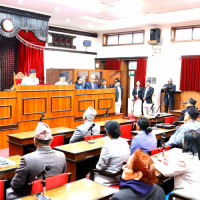- Sunday, 18 January 2026
AI: Another Frontier Of Turf War
With the launch of ChatGPT towards the end of 2022, human civilization appears to have thrust itself into a new age—that of Artificial Intelligence (AI). Although AI has been in use for quite some time now, it was first of its kind for the public’s consumption. AI has become the THING now. It is being used and has the potential to be applied in various sectors, including health, education, and agriculture. However, there are growing concerns that powerful as well as "rogue" states could potentially use AI for political and military purposes.
As nations worldwide debate its potentials and pitfalls, AI has emerged simultaneously as another powerful tool and a new arena of geopolitical competition. Over the past one and a half years, professionals and policymakers alike have been weighing the pros and cons of AI while such platforms kept proliferating. Many US tech giants like Google, Microsoft, Apple, and Meta have rolled out their own versions of AI with various forms and functionalities. However, it is the recent arrival of DeepSeek that has created a louder buzz in the bazaar. The powerful Chinese AI software has had seismic impact on the market, ruffling many feathers in the Global North.
Shockwaves
The fact that China could develop an AI app as efficient as America’s ChatGPT at a fraction of its cost has challenged US dominance in this sector. This has sent shockwaves across the Western world and has left many scrambling for a proper response. A number of countries have already started banning the Chinese app on their official devices. Australia led the way, and many others are likely to follow suit. In the US, while a bipartisan federal bill is being pushed through Congress, some states (e.g., Texas) and agencies (e.g., the Pentagon) have already banned it on their official computers and mobile devices. This appears to further exacerbate the cyber race already underway, mainly between the United States and China. This aligns with the US policy of boycotting Chinese software and hardware, citing “security concerns.”
The US accuses China and Russia of aiding and abetting its hackers in targeting websites of US businesses and government institutions and of spreading disinformation to manipulate democratic political outcomes. The US believes that these new technologies could be repurposed to steal government classified information and citizens’ private data. Huawei has been banned from operating within the US, as the Chinese ICT company is accused of secretly working for Beijing. TikTok, another Chinese company that the US alleges poses a security threat, is likely to meet the same fate if it refuses to sell its US operations to a US company. Both companies deny the accusations.
DeepSeek’s stunning efficiency, and popularity it gained within a short span of time, unsettling as it may be for its rivals, has created what is known as the “Sputnik effect.” This refers to the first successful launch of the Soviet satellite Sputnik in 1957, which shocked the US as it demonstrated Soviet superiority in space science. This spurred the US to aggressively pursue its space programme, landing the first man on the Moon 12 years later. Even though the US holds a significant edge in modern technologies, China is gradually catching up, as evidenced by the popularity of its apps and electronics, as well as the quality of services they provide. The US has suffered some major cyber-attacks in recent times but China appears to have erected a robust cyber wall, as it escaped unscathed when millions of machines across the world were infected by viruses in recent times. Likewise, China has also developed its own separate IT infrastructure, such as data centres and cloud computing services, to reduce its reliance on the West.
All these developments, along with China’s military modernisation, assertiveness in the South China Sea, and increasing military mobilisation on international waters, have left the US-led Western alliance unnerved. They have misgivings about China’s intentions and future plans. They consider China’s rise as a serious threat to the existing global order, which they believe China is determined to rewrite according to its own rulebook. In fact, there are some key areas where China is challenging US dominance. China has not only been expanding its economic footprint through Belt and Road Initiative projects across the globe, including at US’s doorsteps, but it has also been part of efforts pushing for expanded roles for institutions like BRICS and the Shanghai Cooperation Organisation co-founded by China. The intention is to counter Western-dominated institutions like the World Bank and IMF. China and its fellow BRICS members are also alleged to be trying to replace the US dollar with an alternative as the currency for international transactions. And now the launch of DeepSeek has added insults to injuries.
Geopolitical rivalry
Experts say AI is in its infancy at the moment but it has already made its presence felt in the world. While global initiatives, such as the recent AI summit in Paris, are being taken towards establishing cooperative frameworks to regulate AI, the process is complex and cumbersome and not free from conflicts and controversies. The US refused to sign the Paris international agreement on IT, with Vice-President JD Vance saying too much regulation kills creativity, even though China and many other countries, including co-hosts France and India, signed it. Hammering out solutions is hard without cooperation among major stakeholders. How the world navigates this AI-driven geopolitical rivalry will shape the future of global order. Whether AI will evolve as a cooperative platform or become another flashpoint depends how it is used: as a force for greater good or another instrument to serve parochial interests at the cost of others.
(A PhD in political science from State University of New York, Buffalo, the author currently teaches at IACER. govinda@iacer.edu.np)






-original-thumb.jpg)

-square-thumb.jpg)


-original-thumb.jpg)




